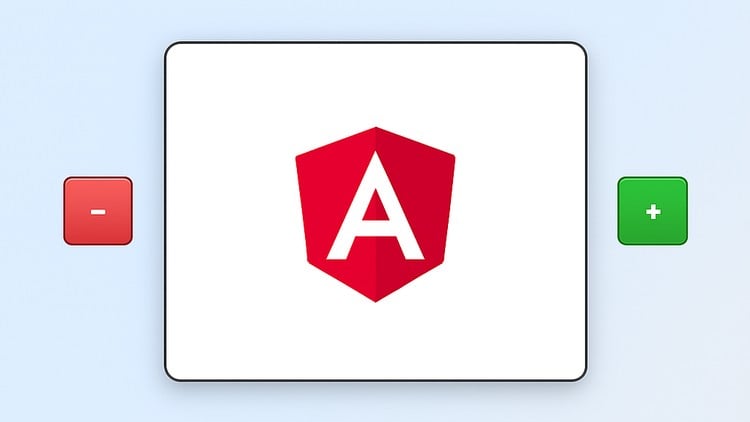
Master the Angular basics with a project-driven approach
⏱️ Length: 47 total minutes
⭐ 4.61/5 rating
👥 3,312 students
🔄 September 2025 update
Add-On Information:
Note➛ Make sure your 𝐔𝐝𝐞𝐦𝐲 cart has only this course you're going to enroll it now, Remove all other courses from the 𝐔𝐝𝐞𝐦𝐲 cart before Enrolling!
-
Course Overview
- This concise, project-based mini-course offers a rapid immersion into modern front-end development, focusing on the latest iteration of a widely-used JavaScript framework.
- Specifically designed for absolute beginners or those seeking an extremely efficient refresher on fundamental framework concepts.
- Master essential paradigms through the practical construction of a straightforward, yet highly illustrative, interactive web application.
- Benefit from an exceptionally efficient 47-minute learning module, enabling quick skill acquisition without a significant time commitment.
- Join a large community of 3,312 highly satisfied students, reflected in an impressive 4.61/5 course rating, affirming its quality and effectiveness.
- Learn with confidence, as the content is meticulously updated to September 2025, ensuring alignment with current best practices and the newest framework version.
- Experience a pedagogical approach that emphasizes hands-on application, where theoretical understanding is immediately reinforced through practical implementation.
-
Requirements / Prerequisites
- A foundational understanding of HyperText Markup Language (HTML) for structuring web content and Cascading Style Sheets (CSS) for basic styling.
- Familiarity with fundamental JavaScript concepts, including variables, functions, and basic data types, to grasp application logic.
- A modern code editor (such as Visual Studio Code) pre-installed and configured on your local machine, ready for active development.
- Node.js runtime environment must be installed, as it is crucial for running the framework’s command-line interface and managing project dependencies.
- Access to a package manager like npm (Node Package Manager) or Yarn, used for installing and managing project libraries efficiently.
- A stable internet connection is necessary for downloading dependencies, accessing course materials, and utilizing online resources.
- A proactive mindset and willingness to actively code along with the instructor, as hands-on practice is paramount for internalizing concepts.
-
Skills Covered / Tools Used
- Modern Development Ecosystem Setup: Configuring your local environment efficiently for building web applications using contemporary framework tooling.
- Front-End Toolchain Proficiency: Gaining practical experience with powerful command-line tools for project initialization and day-to-day management.
- Declarative UI Principles: Understanding the philosophy behind building user interfaces by describing desired states, rather than imperative DOM manipulation.
- Dynamic Content Rendering: Techniques for efficiently displaying and updating information on the web page based on application data and logic.
- User Interaction Management: Implementing responsive behavior to various user inputs and events, creating engaging and interactive application experiences.
- Code Modularity Strategies: Best practices for organizing application logic, presentation, and styling into reusable, manageable units, fostering maintainability.
- Development Server Operations: Running and interacting with local development servers, enabling live reloading and rapid iteration during the coding process.
- Debugging Fundamentals: Developing basic skills in identifying, diagnosing, and troubleshooting common issues in client-side web applications using browser tools.
- Type System Benefits: Appreciating the advantages of static typing for enhanced code quality, improved readability, and early error detection in JavaScript projects.
- Version Control Awareness: Gaining a conceptual understanding of managing code changes and project history using systems like Git, a professional best practice.
- Package Management Workflow: Working with `package.json` to declare project dependencies and understanding how to install and update libraries.
-
Benefits / Outcomes
- Rapidly acquire initial, actionable skills for building interactive web applications with a leading modern front-end framework.
- Gain the confidence and practical know-how to independently initiate new web projects from a blank canvas, understanding setup processes.
- Develop fundamental troubleshooting abilities for common front-end development challenges through hands-on problem-solving experience.
- Apply core programming and framework principles directly in a practical, working application, solidifying theoretical understanding.
- Pave the way for exploring more sophisticated topics within the framework’s ecosystem, such as routing, advanced state management, and backend integration.
- Develop an intuitive grasp of modern web application architecture and design, moving beyond basic static page development.
- Possess a completed mini-project suitable for showcasing initial framework proficiency, an excellent addition to a budding developer’s portfolio.
- Improve problem-solving and logical thinking skills by navigating the process of building a functional application from requirements to execution.
- Become comfortable navigating the conventions, tools, and workflows of a professional front-end development ecosystem.
- Understand the fundamental flow of data and user interactions within a reactive user interface, critical for dynamic applications.
-
PROS
- Highly Focused & Efficient: Expertly concentrates on essential foundations, preventing information overload and enabling rapid skill acquisition in just 47 minutes.
- Project-Based Learning: Reinforces concepts through immediate, hands-on application by building a tangible project, ensuring deeper understanding and retention.
- Up-to-Date Content: Utilizes the very latest Angular 20, ensuring all techniques, tools, and best practices taught are current and highly relevant.
- Positive & Proven Track Record: An outstanding 4.61/5 rating from over 3,300 students attests to its quality, pedagogical effectiveness, and high learner satisfaction.
- Accessible to Beginners: Specifically designed for new learners, simplifying initial complexities and providing a gentle, yet comprehensive, framework introduction.
- Practical Skill Acquisition: Delivers directly transferable skills, empowering students to confidently start building their own modern web applications immediately.
-
CONS
- Limited Scope for Advanced Topics: Due to its foundational focus and extremely short duration, the course does not delve into more complex architectural patterns, advanced state management, or integration with external services, requiring further dedicated study.
Learning Tracks: English,Development,Web Development
Found It Free? Share It Fast!